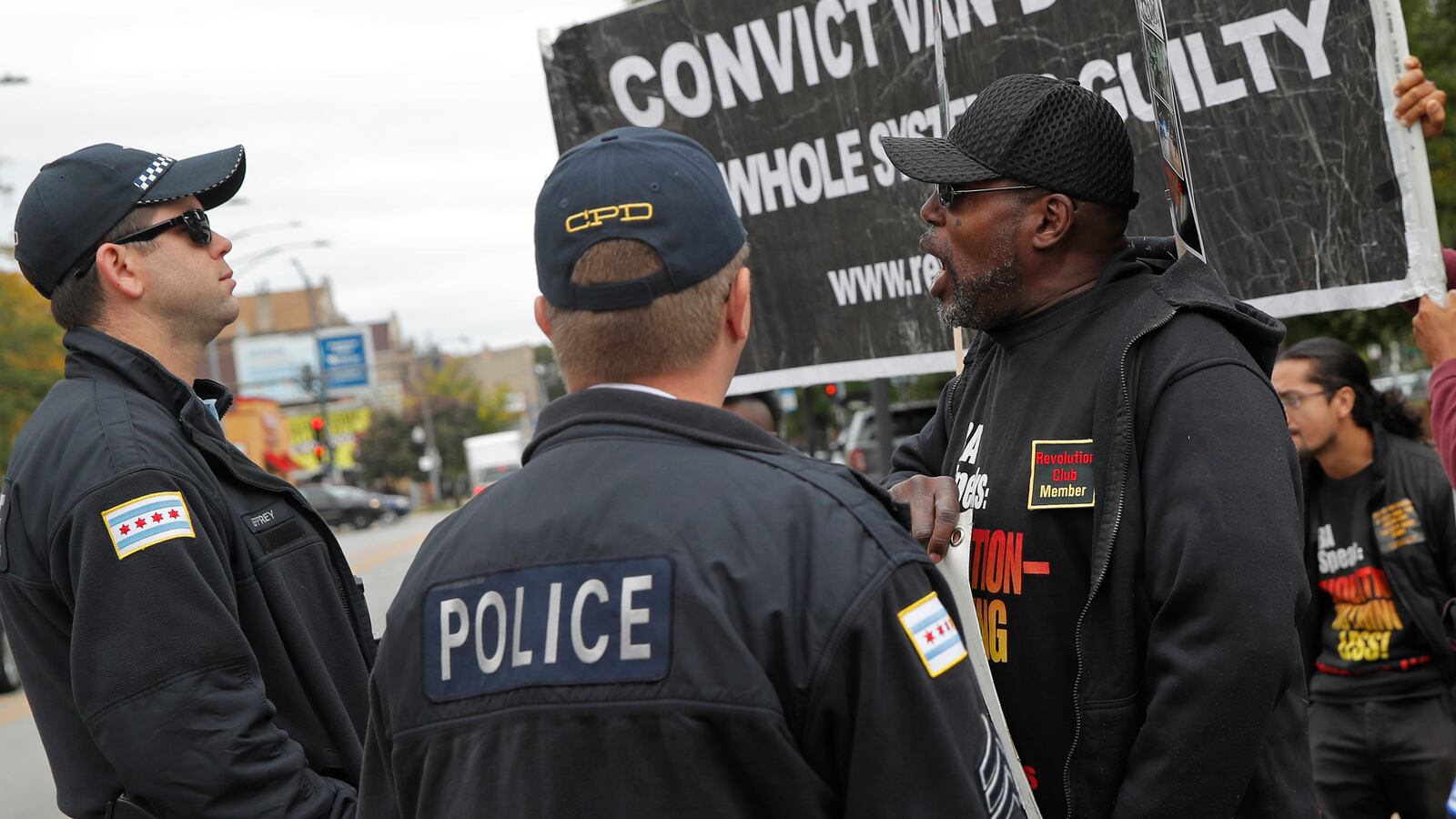As the trial of the police officer accused of fatally shooting Chicago teenager Laquan McDonald reached its dramatic conclusion, public schools sought to assure parents about safety plans, urged teachers to stay neutral during classroom discussions, and preemptively canceled weekend activities.
A jury on Friday found Chicago police officer Jason Van Dyke guilty of second-degree murder in McDonald’s October 2014 death. But in the run-up to Friday’s verdict, tensions in the city were running high. District-run schools did not release students early on Friday. However, some schools canceled after-school classes and clubs, and the district sent a robocall to parents saying that scheduled weekend events would be canceled.
At William Jones College Preparatory High School, a selective-enrollment high school in Printer’s Row near downtown Chicago, video teacher Jake Myers said he had seen heavier police patrols outside his school in the days leading up to the verdict.
The school canceled Friday’s homecoming festivities as well as after-school activities.
Earlier, awareness of the trial had varied among students. “For some students it’s not even registering on their radar,” Myers said Thursday, “while other students are already part of organizing and it’s something they are eagerly anticipating, and they want some form of justice.”
Friday afternoon, Diego Garcia, 16, a student at Noble Mansueto High School, huddled around a laptop with fellow students in his dance class at the end of the school day and watched the verdict live. He said that when they heard the words “guilty,” students erupted in celebration, jumping around, giving each other high fives and hugs.
“I think there’s a lot of things we can still improve on,” he said. “But we’re one step closer to getting justice.”
In official guidance issued districtwide on Wednesday, school officials urged educators to take a neutral stance. “As educators and trusted adults in our students’ lives, we are in a unique position to help them understand and process feelings they may have about the shooting of Laquan McDonald, officer Van Dyke’s trial, and the relationship between law enforcement and the community,” reads a guide sent by Chicago Public Schools.
The guide acknowledges that bringing controversial current events into the classroom is “challenging — especially when we may have our own opinions, perspectives, and feelings,” but that educators “must remain neutral,” a notion that at least one educator challenged on Twitter.
Anticipating strong community reaction and students possibly coping with fear, rumors, and emotions, officials suggested that teachers use conversational tools like talking circles or shared agreements to set up a more structured discussion and offered questions that teachers can ask after the trial to add context to the jury’s decision.
Among the questions that were suggested for educators to use:
● How has the death of Laquan McDonald and the trial of officer Van Dyke impacted our students and our community?
● What are the teachable moments that this controversy offers our students?
● How will we communicate with family and community as we embark upon these discussions with students?
● Are there any takeaways gleaned from this process that we might want to elevate for future development? How can we continue to build student skills, knowledge and dispositions for discussing controversial public issues?
When the city finally released dashcam footage showing the October 2014 shooting of Laquan McDonald, a student at Sullivan House High School in South Shore, the tape shook the city. It showed McDonald felled by 16 shots as he was walking away from Van Dyke. The release of the video led to citywide protests as well as the eventual ouster of Police Chief Garry McCarthy.
The video of his death intensified calls for police reform, spurring a U.S. Department of Justice investigation that found a pattern of racially biased policing and unreasonable use of police force, including in schools. In July, the city released a draft of a federal reform agreement, known as a consent decree, that lays out ways to better screen and train school police officers, limit use of force against students, and curb police involvement in school discipline.
In advance of the verdict, the school district instructions warned teachers that students may feel traumatized, suggested checking in on students who may have experienced trauma, and warned that some emotional responses may manifest as inattention or defiance.
Myers, the teacher at Jones, introduced key words for students to use when discussing issues that are sensitive but which they may not have the words or space to articulate. Someone whose feelings have been hurt can say “ouch,” while a student who made an insensitive comment can say “oops.”
“We want to acknowledge that people are going to feel hurt,” Myers said. He also wants to offer language that is “accessible to high school kids.”
Myers said it is important to continue and engage students on the issue in the weeks ahead. “One of the best things that we can do is keep kids from shutting down and exiting the conversation,” he said.
And, he added, “no matter what, teaching kids to have a baseline respect for each other and acknowledge that the people next to them, their lives are important.”

